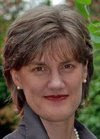Meet this month's contributor - Lee Carter
 This month's contributor is Lee Carter. We thought before we heard her thoughts on this month's book
Don't Waste Your Life, we'd do a short interview so we can 'get to know' her a little first!
This month's contributor is Lee Carter. We thought before we heard her thoughts on this month's book
Don't Waste Your Life, we'd do a short interview so we can 'get to know' her a little first!
How did you come to faith in Christ?
I’m a PK (preacher’s kid), so I grew up in a Christian home. When I was very young my Dad was a Methodist minister in country South Australia, and some of my earliest memories are of going to church and Sunday School every week. I grew up never doubting that God existed – I was always certain he was there. As I grew older however, I began to equate being Christian with being well-behaved and doing the right thing. As a teenager, I became anxious about my standing before God, uncertain of what he was like, and didn’t understand how he could love me if I kept letting him down. Even though I made a commitment in my late teens at a Leighton Ford crusade, an enduring uncertainty about God’s grace and how it applied to me, continued into my early thirties. Then – in his great mercy – God helped me to understand more clearly what he was really like, and how his overflowing love had saved me through the Lord Jesus.
What do you love most about reading?
Reading feeds my soul and my brain. I’m a profoundly introverted person by nature – I live a lot of my life in my head – so for me the outward interactions of everyday life require a lot of energy. I love people, but sooner or later they wear me out, and I need to go and recharge. Because it’s an inward activity, reading is one thing that recharges my energy supplies. Reading widens my horizons and stretches my ideas and, importantly, it is a primary way in which I learn to know and love God more.
What is your favourite novel?
How long is a piece of string? As a child I progressed from Petunia (Roger Duvoisin) and Pippi Longstocking (Astrid Lindgren) to Enid Blyton’s Secret Seven and Famous Five series. Later came Anne of Green Gables (LM Montgomery), whom I adored. I read all the Anne books, and then as a teenager, almost everything Agatha Christie and Georgette Heyer ever wrote. But then in my mid-teens I was introduced to Pride and Prejudice (Jane Austen) and To Kill a Mockingbird (Harper Lee). Although very different, these two novels gave me a deeper love for literature itself – the art of good writing. Through them I experienced, on a completely different level, the power of the written word to teach life lessons through story telling.
What book has helped you the most in growing in your knowledge of God?
Too hard! I’ll have to cheat and nominate two books, one each from two Christian teachers who have had a hugely positive influence on my knowledge of God.
The first is by Jerry Bridges – Transforming Grace: Living Confidently in God’s Unfailing Love. The Lord used this book to work a miracle of grace in my understanding of who he is, what he is like and how he regards me. It moved me out of the trap of legalism and into the freedom of grace. I read it over and over until I ‘got it’, and although it took years to undo a lifetime of wrong ideas about God, it was the catalyst for this transformation to begin.
The second is The Invisible Hand: Do All Things Really Work for Good? by RC Sproul, a well-known Reformed theologian. In this book RC Sproul combines his training in theology, philosophy and logic, and his love of God and Scripture to produce a book which examines God’s providence in the lives of those who love him. Sproul examines the sometimes bewildering, even devastating things which have afflicted God’s people from biblical times until now. He does this in the context of God’s sovereignty, and asks big questions like ‘if God is sovereign, is there such a thing as chance?’ and ‘can God’s sovereignty and human free will coexist?’ His rigorous logic – with a bit of Latin thrown in – makes my brain hurt, but the gift of this book for me is a sure foundation for belief in a loving, sovereign God who is “our fortress, our shield, and our very great reward”.